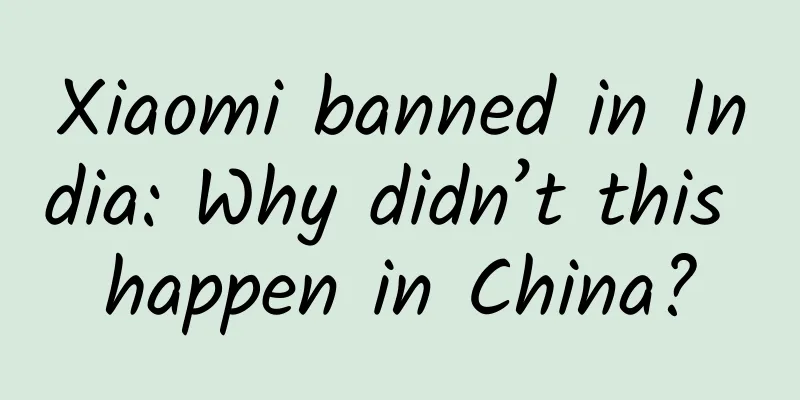Xiaomi banned in India: Why didn’t this happen in China?

|
Recently, Xiaomi, which has just been thriving in the Indian mobile phone market, was banned from selling in the Indian market because it refused to pay reasonable licensing fees for Ericsson's related technology (according to Ericsson's official statement). However, we believe that this matter should be resolved soon, and Xiaomi will just have to pay some money. According to the media, it is like spending money to avoid disaster. But what we need to think about through this matter is why this lawsuit did not happen in the Chinese market first? We do not deny that there are differences in the formulation and specific implementation of patent-related laws in various countries, but given the fact that Xiaomi uses other people's technology (patents) without paying, even if there are big differences in the law, this basic fact is enough to make Xiaomi face patent lawsuits in the Chinese market and the Indian market. But the fact is that foreign companies in China not only rarely file patent lawsuits against Chinese manufacturers who violate or use their patents for free, but are investigated on grounds such as monopoly. For example, Qualcomm's antitrust investigation in China, which is still awaiting the results of the investigation (the core is still the issue of collecting patent fees). It can be seen that in the Chinese market (such as the smartphone market), we may not have formed an effective patent protection system and awareness at all. This can be seen from Qualcomm's previous statement that it was worried that some manufacturers in China would not pay Qualcomm licensing patent fees, which might affect Qualcomm's future revenue and profits. I wonder what the industry sees here? Qualcomm is not worried about the reduction of licensing fees in the future, but is afraid that some Chinese companies will use Qualcomm's antitrust investigation to not pay patent fees at all, or to exacerbate this trend (because many Chinese companies did not pay patent fees to Qualcomm before). Considering the background and reasons why Qualcomm encountered antitrust investigations in China (allegedly reported by relevant Chinese companies), it seems that the bad guys are the first to sue. Of course, we are not referring to all Chinese mobile phone companies here, but there are definitely some so-called ill-intentioned or taking advantage of the fire. Under such a large market background, which foreign company will take the risk to sue Chinese mobile phone manufacturers (only referring to mobile phone-related patent licensing)? The final result is likely to be a bite back. Even if a lot of manpower and material resources are spent, it may not necessarily get the results you expect. What puzzles us is that recently, Chinese mobile phone companies have suddenly begun to pay attention to patents. For example, it was previously rumored that Huawei, ZTE and other manufacturers would sue Xiaomi and other related companies for patent infringement or failure to pay patent licensing fees. But it is said that these Chinese companies have previously requested an antitrust investigation against Qualcomm (because it used its monopoly position to charge excessive patent licensing fees). Is this a great irony for our companies? Or has the so-called value of patents become a replica of "usefulness is truth" in the eyes of our domestic manufacturers? For their own interests, they can subjectively devalue or raise the value of patents. But like foreign related companies in China, although the patent war between each other is clamoring loudly and even alarmist, it is always thunder and rain. These manufacturers must also know that given the current status of patent protection in China, the result of filing a lawsuit may not be as expected, and may even be more than worth the loss, that is, the patent holders may not gain any substantial gains through litigation, and the cost paid by the patent infringing manufacturers is not enough to make them suffer any serious losses. To sum up, we believe that Xiaomi's (temporary) ban in India reflects China's current situation of patent protection, which is weak and superficial. The value of patents is abused by some Chinese mobile phone companies, and the patents fail to play an offensive or defensive role, which may ultimately affect our companies' innovation motivation and capabilities in the industry. Perhaps one day, when our related companies have similar results in the Chinese market as Xiaomi (note: not specifically Xiaomi) in the Indian market, even if it is temporary, it will be a major step forward in our patent protection. As a winner of Toutiao's Qingyun Plan and Baijiahao's Bai+ Plan, the 2019 Baidu Digital Author of the Year, the Baijiahao's Most Popular Author in the Technology Field, the 2019 Sogou Technology and Culture Author, and the 2021 Baijiahao Quarterly Influential Creator, he has won many awards, including the 2013 Sohu Best Industry Media Person, the 2015 China New Media Entrepreneurship Competition Beijing Third Place, the 2015 Guangmang Experience Award, the 2015 China New Media Entrepreneurship Competition Finals Third Place, and the 2018 Baidu Dynamic Annual Powerful Celebrity. |
<<: Meizu Blue challenges Redmi: Is there still a chance in the thousand-yuan phone market?
>>: WeChat management lags behind: latecomers are victims of the system
Recommend
Essential: 126 tools and 15 promotion channels for a complete event planning
"What tools are needed for a complete event?...
Talk about 5 distribution mechanisms of video content
What position does content distribution occupy in...
How can Kugou improve the conversion rate of paid members?
The author is a karaoke enthusiast. When using th...
Why are these sunglasses glare-proof?
As office workers, driving is our common way of t...
Seeing the classic three-color plastic sheeting, I couldn’t help but wonder, can waterproofing and breathability co-exist?
Produced by: Science Popularization China Author:...
How can the elderly build a "psychological defense line" while staying at home?
Not long ago, a report about a 70-year-old man li...
Mom's Body Shaping Class
Introduction to Mom's Body Shaping Class Reso...
The realm of "stealing skills": creating oneself from classics | Yihai Shizhen
How did the talented painter Lippi learn from oth...
6 trends of smart hardware in 2015
[[124824]] 2014 is coming to an end, and it is cl...
Guangdiantong advertising introduction, Guangdiantong advertising placement
Guangdiantong is an advertising platform based on...
Where is safer on a smoggy day? Three dads try out the PM2.5 detector
It was not until December that we realized that t...
The strong evidence for Wegener's "continental drift theory" turned out to be manatees and ostriches?
Before the early 20th century, the most popular e...
From love banks to bullet messages, can fission achieve "standardization"?
I wonder if you have paid attention to the Love B...
Too short. Apple Watch only has enough battery for 3 hours?
January 23 (Reporter Zhang Qian) If the battery l...
Building a "space station" on Earth: A look at the first large scientific facility in my country's aerospace field
In an orbit more than 400 kilometers above the ea...






![How to operate Tmall [Billion Club] merchant page?](/upload/images/67cc3a401a856.webp)


